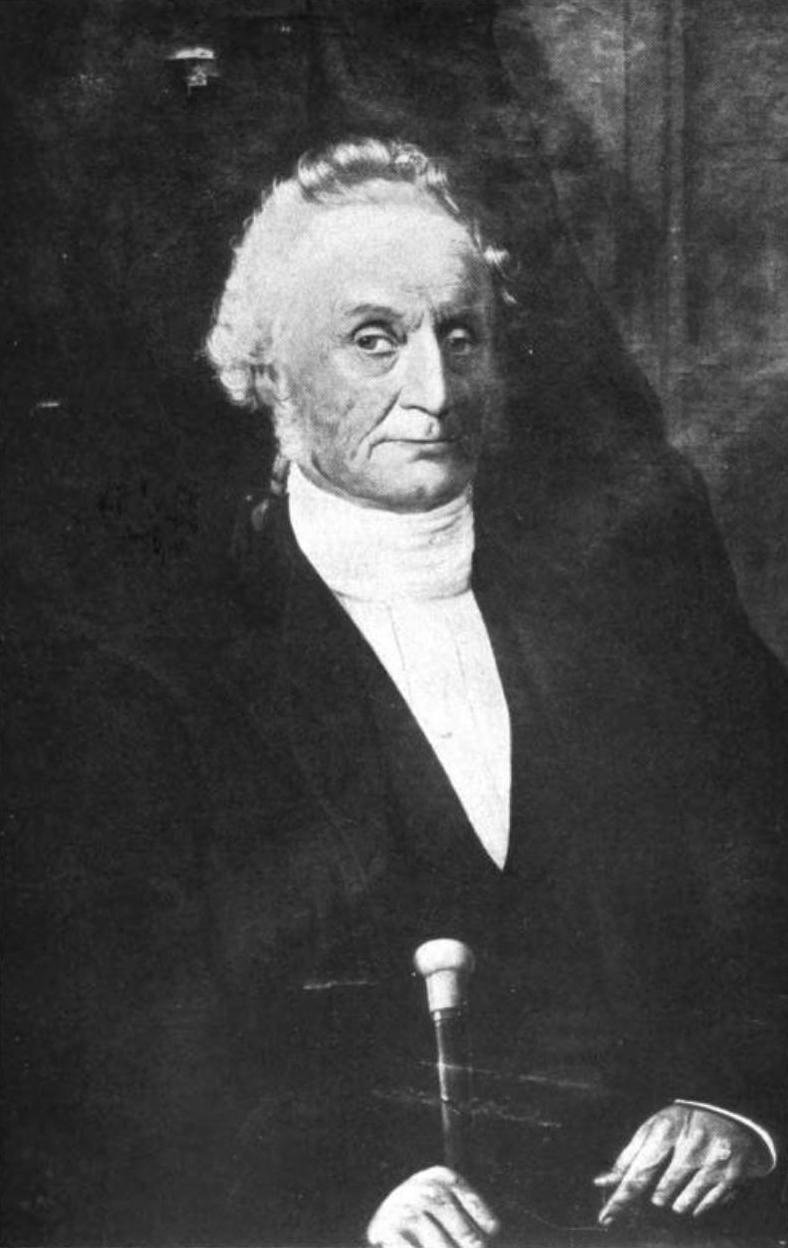Member Biography
William Rudolph Smith

| Sessions | Office | Position | District | Party |
|---|---|---|---|---|
| 1822-1823 | 17 | Federalist | ||
| 1823-1824 | 17 | Federalist |
COUNTIES: Huntingdon, Mifflin
Biography
08/31/1787 - 08/22/1868
Brigadier General William Rudolph Smith (Federalist17) Huntingdon and Mifflin Counties 1822-1824
Early Life
Brigadier General William Rudolph Smith, born August 31, 1787, Trappe, Montgomery County, Pennsylvania, son of Doctor William Moore Smith and Anne Rudolph Smith; educated, grandfather, William Smith, provost, College of Philadelphia; admitted, Pennsylvania Bar, 1808; moved, Huntingdon, Pennsylvania, a town that had been laid out by his grandfather, attorney law practice; appointed, Deputy Attorney General, Cambria County, 1811; colonel, major general, 62nd Pennsylvania Reserves, War of 1812-1815; Unsuccessful campaign, Pennsylvania State Senate, 1812; elected, Pennsylvania House of Representatives, 1819-1822; unsuccessful campaigns, Pennsylvania State Senate, 1820; elected, Brigadier General, 2nd Brigade, 10th Division Pennsylvania, 1821; elected, Federalist, Pennsylvania State Senate, 1822-1824; presidential elector, Martin Van Buren, 1836; presidential appointee, commissioner, United States, 1836; presidential appointee, adjutant general of Wisconsin Territory Militia, 1839-1848; Wisconsin Militia 1848-1851; served, district attorney for Iowa County, Wisconsin Territory, 1840-1848, secretary, Wisconsin territorial upper house, 1845-1846; delegate, Wisconsin, first state constitutional convention, 1846; [SG1] 5th Attorney General of Wisconsin, 1856-1858; after leaving office, retired from public affairs; married, Eliza Anthony 1809, (d. 1821) children, William Anthony Smith, married, Mary Hamilton Van Dyke, 1823, children, Penelope C. "Nellie" Henry, Richard Moore Smith, John Montgomery Smith, Maria Letitia Smith; died, August 22, 1868 (aged 80) Quincy, Adams County, Illinois; interment, Graceland Cemetery, Mineral Point, Iowa County, Wisconsin.
Early Career:
Colonel, Major General, 62nd Pennsylvania Reserves, War of 1812; led the regiment in support of the Erie Campaign, Battle of Lundy's Lane; Battle of Baltimore, witnessed the disastrous Battle of Bladensburg, the subsequent burning of Washington, District of Columbia.
Professional titles; business ownership; board memberships; local government; club memberships:
Incorporator, Trinity Episcopal Church, Mineral Point, Wisconsin; organized, first Masonic Lodge, southern Wisconsin, 1841.
Authored:
William Rudolph Smith, Observations o the Wisconsin Territory: Chiefly on that part called the "Wisconsin Land District" (Philadelphia: E.L. Carey & A. Hart, 1838) (Arno Press, 1975)
The History of Wisconsin: In Three Parts, Historical, Documentary, and Descriptive: Completed by Direction of the Legislature of the State (Madison, Wisconsin: Beriah Brown, Printer 1854) (2 vols.)
Incidents of a Journey from Pennsylvania to Wisconsin Territory, in 1837, being the Journal of Gen. William Rudolph Smith, U.S. Commissioner for Treaty with the Chippewa Indians of the Upper Mississippi (Chicago: W. Howes, 1927) (including a brief biographical sketch of Smith by John Goadby Gregory)
As state historian, began the compilation of a projected three-volume history of Wisconsin. Although two volumes (a narrative history and a collection of documents) were eventually published (1854-1855), the third was never completed. After retiring as president of the Historical Society in 1861, Smith spent his remaining years collecting information on Wisconsin history.
Pennsylvania Politics:
Appointed, Deputy Attorney General, Cambria County, 1811.
Unsuccessful campaigns, Pennsylvania State Senate, 1812, 1820.
Member, Pennsylvania House of Representatives, Centre and Clearfield district, 1819–1822.
Member, Federalist, Pennsylvania State Senate, 17th district, Special Election, Huntingdon and Mifflin Counties, 1823-1824; vacancy resignation, Michael Wallace resigned his seat prior to the beginning of the session, replaced by William R. Smith; unsuccessful campaign reelection, 1824.
Continued Government Service/National Politics:
Presidential elector, Martin Van Buren, 1836.
Appointed, commissioner, United States, along with Wisconsin Territory Governor Henry Dodge, to negotiate with the Chippewa to purchase their lands in the forests around the Upper Mississippi River and its tributaries. He moved to the Wisconsin Territory and settled at Mineral Point, in Iowa County. His negotiations with the Chippewa ultimately produced a successful treaty which resulted in the United States acquiring most of the territory of modern-day Minnesota, 1836.
Appointed, President Martin Van Buren, adjutant general of Wisconsin Territory Militia, 1839-1848; Wisconsin Militia 1848-1851; served, district attorney for Iowa County, Wisconsin territorial, 1840-1848, secretary, Wisconsin territorial upper house, 1845-1846; delegate, Wisconsin, first state constitutional convention, 1846.
5th Attorney General of Wisconsin, 1856-1858; after leaving office, retired from public affairs.
Legacy:
Wife, Eliza Anthony, granddaughter of Michael Hillegas, first Treasurer, United States.
Wife, Mary Campbell Van Dyke, niece, Congressman Thomas Jefferson Campbell, Tennessee.
Uncle, Pennsylvania State Senator, Richard Smith (Federalist no district number) Bedford and Huntingdon Counties, 1797-1801.
Richard Smith - Pennsylvania Senate Library (pasen.gov)
Son, Doctor William Anthony Smith, surgeon, Union Army, American Civil War.
Son, Richard Moore Smith, Wisconsin State Assembly, 1856.
Son, John Montgomery Smith, Wisconsin State Assembly, 1892.
Father, Doctor William Smith, Anglican Priest. Educator. Benjamin Franklin asked him to teach at a new school to be established in Philadelphia. Smith came to the city to teach natural philosophy and became the first provost (first president) of the College of Philadelphia, a position he held from 1754-1779. Because of a misconception of Smith as a loyalist, the Pennsylvania legislature established the new University of Pennsylvania in 1779. Smith served on the Philadelphia Committee of Correspondence in 1774 serving with such notables as John Dickinson, Samuel Miles, and Joseph Reed. He moved to Maryland and became the first president of Washington College. Later, after the revolution ended, and Smith was no longer seen as a loyalist, the College of Philadelphia merged with the University of Pennsylvania, and Smith was the new school's provost from 1802-1803. In 1757, Smith was the editor of The American Magazine and Monthly Chronicle for the British Colonies which was published by fellow Philadelphian William Bradford.
Cited:
Cox, Harold. "Senate Members S". Wilkes University Election Statistics Project. Wilkes University.
A New Nation Votes (tufts.edu)
Journal of the Senate of the Commonwealth of Pennsylvania (Report). Vol. 34. Harrisburg, Pennsylvania: Christian Sleim. 1823. page 4.
#7 - Journal. 1823-24 v.34. - Full View | HathiTrust Digital Library
William Rudolph Smith 1787-1868". Wisconsin Historical Society.
Smith, William Rudolph 1787 - 1868 | Wisconsin Historical Society (wisconsinhistory.org)
Semi-Weekly Wisconsin Milwaukee, Wisconsin, Saturday August 29, 1868, Page 2.
Gen William Rudolph Smith (1787-1868) - Find a Grave Memorial